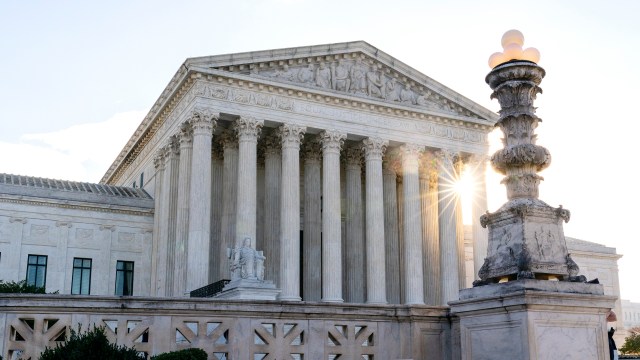
“In Grants Pass, in particular, there’s no municipal homeless shelter system,” according to the Center for Constitutional Rights.
Late in April, the Supreme Court of the United States will hear arguments regarding the legality of Grants Pass, Oregon’s homelessness laws, but a group of individuals claims that these policies disproportionately harm the LGBTQ+ community.
The city is appealing a lower court’s decision in City of Grants Pass v. Johnson, which found that the state’s laws prohibiting public camping violated the Eighth Amendment’s prohibition against cruel and unusual punishment.
However, the group argues that the city’s homelessness policies pose a “grave threat” to the LGBTQ+ community and contends that a ruling in favor of the city would harm hundreds of thousands of unhoused individuals across the U.S.
On April 3, CCR filed an amicus brief — or a “friend of the court” document — offering their expertise on LGBTQ+ issues to the high court. The amicus brief is supported by 46 LGBTQ+ rights organizations, arguing the Supreme Court should rule against Grants Pass’ ordinances for violating the Eighth Amendment.
They argue that the Grants Pass Municipal Code included five distinct ordinances for camping or sleeping in public spaces, each of which imposed a civil fine of up to several hundred dollars.
Repeat offenders of the ordinances were banned from all city property. Following the ban, unhoused individuals who were still found on city property could have been cited for trespassing.
According to CCR, the city’s policies disproportionately impact the LGBTQ+ community, which experiences homelessness at “extremely high rates” due to discrimination and bias and are “more likely than straight, cisgender people to be unhoused, due to systemic causes,” including family rejection, lack of safe shelters, and discrimination in schools, employment, and housing.
CCR said homelessness is prevalent among LGBTQ+ youth— and even though this group makes up less than 10% of the U.S. population, LGBTQ+ youth account for 40% of all unhoused youth, and 65% of youth experiencing chronic homelessness.
The organization added that LGBTQ+ youth of color are also more likely to be unhoused, and that transgender individuals are eight times more likely than their straight, cisgender counterparts.
“It really starts with having a home and not being criminalized for using your agency to sleep in a place where you feel safe to sleep,” said Mikaila Hernández, a Bertha Justice Fellow and CCR attorney. Many shelters are hostile toward LGBTQIA+ people, according to Hernández. Many will openly reject them or refuse to protect them when they experience harassment or mistreatment within the shelter system.
“In Grants Pass in particular, there’s no municipal shelter system, and the only consistent overnight shelter is the Gospel Rescue Mission, and it’s a high-barrier shelter, which means that it requires daily Christian service attendance, compliance with other rules, and of course, it’s not exactly a welcoming environment to the queer community and not exactly a safe place for them to stay,” Hernández continued. “We want to be able to help people make that choice if they need to sleep in their car or perhaps camp in a park with minimal protection from the elements. Making a choice that prioritizes their own personal safety and well-being shouldn’t be criminalized against them.”
“We even have a story from an individual who reached out and wanted to tell the Supreme Court about how they experienced discrimination in the housing industry. And that led to them ending up on the streets, just wanting to sleep on the streets because there’s just no protection in that space that’s meaningful and that’s being enforced,” she added.
In the eyes of CCR, the LGBTQ+ community is subject to the “discrimination to incarceration pipeline.”
“People are put into the criminal legal system if they are unhoused, policed on the streets, and later criminalized for the status of being homeless,” Hernández said. “And then you have this vicious cycle that you can never break.”
Despite federal protections against LGBTQ+ discrimination, CCR said “policy failures” and systemic biases persist.
“Even though there have been clear Supreme Court rulings that LGBTQ+ people are protected by federal civil rights laws prohibiting employment discrimination, it continues to occur. You can see why the LGBTQ community is experiencing economic precarity as a result of all these things. And as a result, you see these staggering rates of homelessness,” furthered Chinyere Ezie, a senior attorney for CCR.
CCR predicts that the Supreme Court will make a decision on the matter over the summer.
Gloria Johnson and John Logan, both residents of Grants Pass, brought a case before the U.S. Court of Appeals for the Ninth Circuit. The court of appeals ruled that the city’s policies violated the Eighth Amendment. The judges based their ruling on the 2018 Martin v. City of Boise case, which also cited the Eighth Amendment.
In July 2023, the Supreme Court decided to review the case in January 2024 concerning Grants Pass’ camping restrictions.
In a statement to KOIN 6 News, Theane Evangelis, counsel for the City of Grants Pass, said, “The Ninth Circuit’s decisions in Johnson v. City of Grants Pass and Martin v. Boise have contributed to the growing problem of encampments in cities across the West. More than three dozen briefs on behalf of hundreds of amici, including the United States, 24 States, and 35 cities, agree that the Ninth Circuit’s judgment in this case cannot stand. These actions have tied local governments’ hands as they work to address the urgent homelessness crisis because they are legally untenable. The unfortunate consequence of these choices is that the people they claim to protect are actually at risk. Later this month, we anticipate presenting our arguments to the Supreme Court.”



